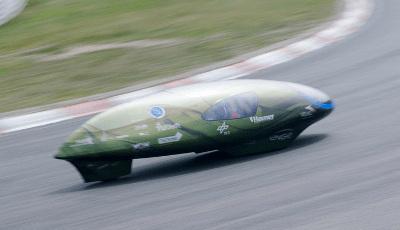Driving 3500 km on 1 Liter of Fuel Equivalent
March 15, 2017
on
on

Students of the Delft University of Technology are working on an ultra fuel efficient vehicle. In May of this year their hydrogen powered car will compete in the Shell Eco-marathon Europe. The aim is to drive 3500 km on the energy equivalent of 1 liter of gasoline (energy in hydrogen converted to energy in liter gasoline).
After months of designing the team is now in the production phase of the Eco-Runner VII, the 7th iteration of the vehicle since the team was established in 2005. That year three students from the aerospace faculty decided to put the theory of their studies into practice. Every September since then, new students join the team to work towards the Eco-marathon challenge in the spring.
Each team tries to improve the work of their predecessors. The 2016 team which built the Eco-Runner VI had brought aerodynamics close to perfection, so the 2017 team spent little time on that. Instead, most work was done on making the hydrogen system more efficient in order to give the car the same boost with fewer fuel cells. The team also hopes to knock off a significant number of kilos. From 41.5 kg for the VI to 34 kg when the VII is finished.
The rules of the contest state that it is mandatory to have a pilot steering the car. But it’s an on-board computer that calculates how to drive most efficiently based on sensor data.
After months of designing the team is now in the production phase of the Eco-Runner VII, the 7th iteration of the vehicle since the team was established in 2005. That year three students from the aerospace faculty decided to put the theory of their studies into practice. Every September since then, new students join the team to work towards the Eco-marathon challenge in the spring.
Each team tries to improve the work of their predecessors. The 2016 team which built the Eco-Runner VI had brought aerodynamics close to perfection, so the 2017 team spent little time on that. Instead, most work was done on making the hydrogen system more efficient in order to give the car the same boost with fewer fuel cells. The team also hopes to knock off a significant number of kilos. From 41.5 kg for the VI to 34 kg when the VII is finished.
The rules of the contest state that it is mandatory to have a pilot steering the car. But it’s an on-board computer that calculates how to drive most efficiently based on sensor data.
Read full article
Hide full article


Discussion (0 comments)